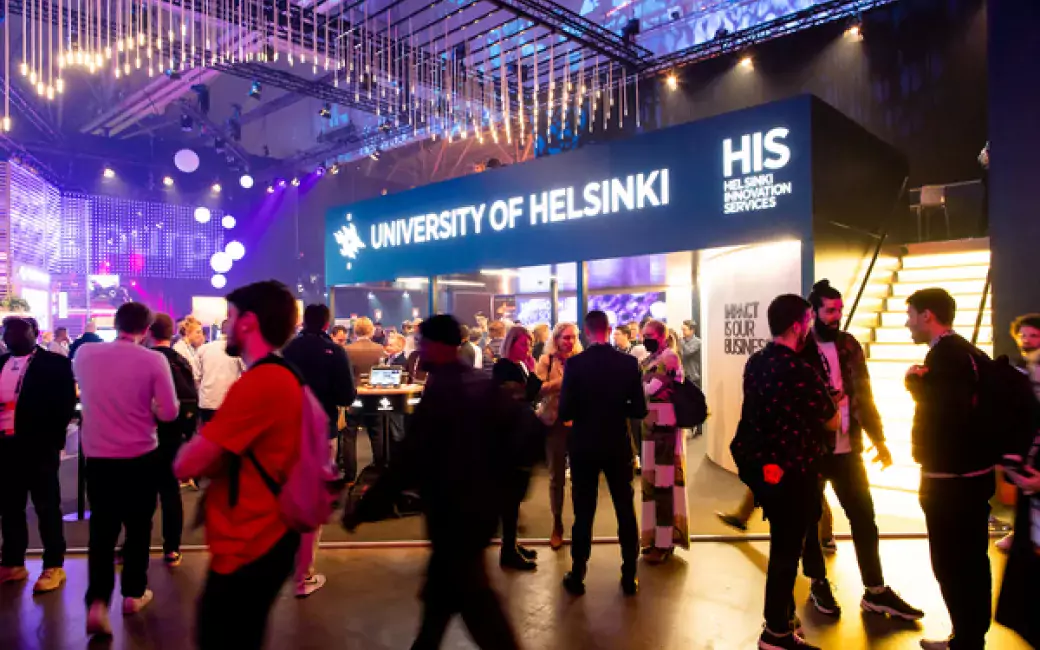Our science-based innovations are responding to global challenges in fields such as health and energy. The University of Helsinki's special strength lies in its multidisciplinary approach, which also applies to our innovation activities, says Taina Kyllönen, Head of the Inno team.

How can vaccines maintain their efficacy over long journeys? How can a new technique for producing hydrogen from water help various industries progress towards carbon neutrality?
Research generates innovations that engender wellbeing and promote sustainability. At Slush, the global startup event, the University of Helsinki will present research-based solutions for challenges in fields such as health and energy.
With the Living Human Brain solution, the cells of any individual can be cultured into a "mini-brain", or human brain tissue, which can be used in pharmaceutical studies and development before embarking on expensive clinical trials.
Globevac is developing a technical solution that will maintain the efficacy of vaccines at all temperatures, which would extend the global reach of vaccines to regions where access to them has previously been limited due to interruptions in the cold chain.
Perfat Technologies offers food producers a new kind of fat that is both healthier and more sustainable than the traditional fats widely used in the industry, such as butter and palm oil.
You can familiarise yourself with nine research-based spinouts or innovations at the advanced stages of commercialisation from 30 November to 1 December at the University's Slush stand at the Helsinki Expo and Convention Centre.
The University of Helsinki and Helsinki Innovation Services are Slush's main partners.
Y Science seeks solutions through life sciences
Research-based innovations are also on display elsewhere at Slush. Among the top 20 competing for a €1 million investment in the Slush 100 Startup Competition is Ample, who are developing a new kind of platform for public discussion.
Ample is a graduate of the University of Helsinki's Incubators, where participants work towards establishing businesses around their ideas and research, receiving support and education.
On 30 November, the University's official Slush side event Y Science brings together researchers and business operators specialising in life sciences to seek solutions to questions related to health, food systems, forests, and the environment. The event is organised by the Helsinki Institute of Life Science HiLIFE at the University of Helsinki.
Y Science will feature multiple sessions, with commercialisation projects focused on health, food technology, and new materials going head-to-head in thematic pitching competitions, and novel life science solutions originating from research conducted at the University of Helsinki being presented at the Science to Business Runway.
Vice-Rector Overseeing Innovations and Infrastructures Jouni Hirvonen and Director of Economic Development Marja-Leena Rinkineva from the City of Helsinki will take part in a panel discussion to share views onthe growing role of universities as drivers of the local economy and how cities can support science-based innovations.
Strong multidisciplinary innovation expertise
In recent years, the University of Helsinki has invested millions in innovation and entrepreneurship support activities. For example, a total of 55 businesses have been launched in the first 18 months of the Helsinki Incubators' operations.
"There still remains an enormous amount of potential for developing innovations at universities, including in cooperation with businesses," says Director of Communications and Community Relations Taina Kyllönen, who heads the University's Inno team.
According to Kyllönen, the exceptional unity of all political parties in terms of increasing funding for research, development, and innovation demonstrates that politicians too recognise the great significance of research-based innovations to Finland's vitality and growth.
"The great strides made by the University of Helsinki through its major investments in innovation operations in recent years contribute to Finland's ambitious RDI goals, as evidenced by the innovations we're presenting at Slush."
The multidisciplinary nature of innovation operations is a special asset to the University, with strong innovation expertise in the fields of life sciences, artificial intelligence, the humanities, social sciences, and others.
The University encourages students and researchers to engage in entrepreneurship, providing support from developing their business ideas all the way to establishing and growing startups.
At the moment, the University is drafting an innovation roadmap to be published at the beginning of 2024, setting goals to be achieved by 2030.
"In the long run, we wish to be not only the leader in Finland and the Nordic countries, but also one of the best innovation universities in Europe," says Kyllönen.






